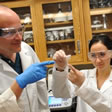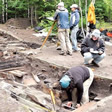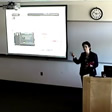 The issues that really matter in metropolitan areas transcend political boundaries. Those regional challenges are becoming even more critical in a global economy, since good planning will be key to the economic competitiveness of megaregions like the Northeast, the Texas Triangle and the Great Lakes, says Louise Nelson Dyble, an assistant professor of history… [read more]
The issues that really matter in metropolitan areas transcend political boundaries. Those regional challenges are becoming even more critical in a global economy, since good planning will be key to the economic competitiveness of megaregions like the Northeast, the Texas Triangle and the Great Lakes, says Louise Nelson Dyble, an assistant professor of history… [read more]
 Felicia Nip, a third-year biochemistry and molecular biology major, is one of the 20 recipients to receive a Summer Undergraduate Research Fellowship (SURF) award. Nip has a genetics and toxicology project with mentor Thomas Werner, assistant professor of genetics and developmental biology… [read more]
Felicia Nip, a third-year biochemistry and molecular biology major, is one of the 20 recipients to receive a Summer Undergraduate Research Fellowship (SURF) award. Nip has a genetics and toxicology project with mentor Thomas Werner, assistant professor of genetics and developmental biology… [read more]
 Mike Meyer has been appointed the new director for the Center for Teaching and Learning. He will start his new duties on July 9. Meyer has been senior lecturer in the physics department since 2010. He was elected to Tech’s Academy of Teaching Excellence and won the Distinguished Teaching Award in 2011… [read more]
Mike Meyer has been appointed the new director for the Center for Teaching and Learning. He will start his new duties on July 9. Meyer has been senior lecturer in the physics department since 2010. He was elected to Tech’s Academy of Teaching Excellence and won the Distinguished Teaching Award in 2011… [read more]
 It was an idea begun at a conference seven years ago. Michigan Tech hosted the Fifth Biennial International Feminism(s) and Rhetoric(s) Conference in 2005, and conference coordinators Beth Flynn, Ann Brady, and Patty Sotirin, all faculty members in the Department of Humanities, realized the resilience of those who made it to campus after a storm had closed the local airport… [read more]
It was an idea begun at a conference seven years ago. Michigan Tech hosted the Fifth Biennial International Feminism(s) and Rhetoric(s) Conference in 2005, and conference coordinators Beth Flynn, Ann Brady, and Patty Sotirin, all faculty members in the Department of Humanities, realized the resilience of those who made it to campus after a storm had closed the local airport… [read more]
 Don’t miss the 2012 Alumni Reunion at Michigan Tech. Among the featured groups will be the Department of Biological Sciences, which will be honored for its 50th anniversary. The reunion takes place August 2, 3, and 4. There will be tours, picnics, talks, sporting events, ceremonies, and many other social events… [read more]
Don’t miss the 2012 Alumni Reunion at Michigan Tech. Among the featured groups will be the Department of Biological Sciences, which will be honored for its 50th anniversary. The reunion takes place August 2, 3, and 4. There will be tours, picnics, talks, sporting events, ceremonies, and many other social events… [read more]
 To develop IT professionals with skills that met the firm’s needs, Jackson ($120 billion in assets) began intern and training programs. The insurer was subsequently able to identify schools, such as Michigan Tech in nearby Houghton, Mich., whose [computer science] students were better trained and of a high quality in terms of their intellectual abilities, attitude and work ethic… [read more]
To develop IT professionals with skills that met the firm’s needs, Jackson ($120 billion in assets) began intern and training programs. The insurer was subsequently able to identify schools, such as Michigan Tech in nearby Houghton, Mich., whose [computer science] students were better trained and of a high quality in terms of their intellectual abilities, attitude and work ethic… [read more]
 Chanavia Smith won a competitive national Benjamin A. Gilman International Scholarship to support a year of study in Japan. A third-year student in Michigan Tech’s College of Science and Arts, Smith is majoring in social sciences with a concentration in law and society and a double minor in diversity studies and international studies… [read more]
Chanavia Smith won a competitive national Benjamin A. Gilman International Scholarship to support a year of study in Japan. A third-year student in Michigan Tech’s College of Science and Arts, Smith is majoring in social sciences with a concentration in law and society and a double minor in diversity studies and international studies… [read more]
 Last year, the crew in Tech’s industrial archaeology program, led by associate professor of social sciences Timothy Scarlett, excavated the Cliff Mine site where they uncovered and studied the foundation of part of the mill. Tour dates are on Saturdays and Sundays, June 16 and 17, June 23 and 24 and June 30 and July 1… [read more]
Last year, the crew in Tech’s industrial archaeology program, led by associate professor of social sciences Timothy Scarlett, excavated the Cliff Mine site where they uncovered and studied the foundation of part of the mill. Tour dates are on Saturdays and Sundays, June 16 and 17, June 23 and 24 and June 30 and July 1… [read more]
 Last week’s public presentations by the two final candidates for director, Center for Teaching and Learning, are available for online viewing at the links provided below. The two candidates are Debra Charlesworth, assistant to the dean, Graduate School; and Michael Meyer, senior lecturer, Physics… [read more]
Last week’s public presentations by the two final candidates for director, Center for Teaching and Learning, are available for online viewing at the links provided below. The two candidates are Debra Charlesworth, assistant to the dean, Graduate School; and Michael Meyer, senior lecturer, Physics… [read more]
 Assistant Professor of Psychology Edward Cokely and colleagues have published on risk literacy as communicated through the use of graphs and other visual aids. The work has received the attention of several European and American newspapers and websites. One of the publications earned a Best Paper Award by the American Psychological Association… [read more]
Assistant Professor of Psychology Edward Cokely and colleagues have published on risk literacy as communicated through the use of graphs and other visual aids. The work has received the attention of several European and American newspapers and websites. One of the publications earned a Best Paper Award by the American Psychological Association… [read more]